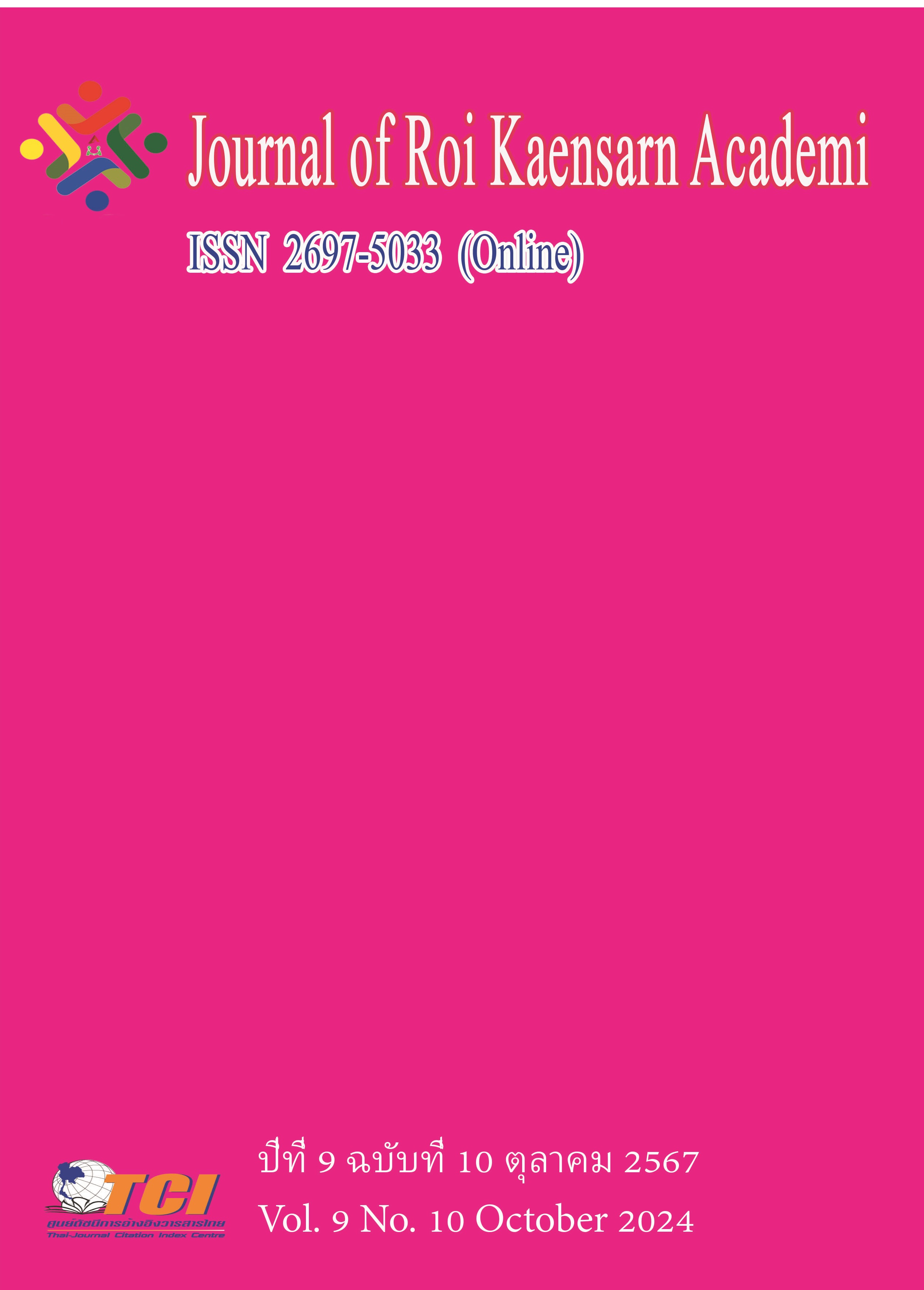การพัฒนาทักษะการนำความรู้ไปใช้ของนักศึกษาชั้นปีที่ 1 สาขาวิชาคณิตศาสตร์ คณะครุศาสตร์ มหาวิทยาลัยราชภัฏราชนครินทร์ โดยใช้หลักสูตรฝึกอบรม เสริมทักษะการนำความรู้ไปใช้
Main Article Content
บทคัดย่อ
ผลการเรียนรู้ตามกรอบมาตรฐานคุณวุฒิระดับอุดมศึกษาแห่งชาติ ด้านที่ 3 กำหนดให้บัณฑิตต้องมีความสามารถในการวิเคราะห์สถานการณ์และใช้ความรู้ความเข้าใจในแนวคิด หลักการ ทฤษฎีและกระบวนการต่างๆในการคิดวิเคราะห์และการแก้ปัญหา เมื่อต้องเผชิญกับสถานการณ์ใหม่ๆที่ไม่ได้คาดคิดมาก่อน ซึ่งเป็นทักษะการคิดที่ซับซ้อน ดังนั้น การพัฒนาทักษะการนำความรู้ไปใช้ซึ่งเป็นทักษะตัวสุดท้ายของทักษะการคิดที่เป็นแกน จึงเป็นความจำเป็นเพื่อใช้เป็นพื้นฐานของการพัฒนาทักษะการคิดที่ซับซ้อนต่อไปและทักษะการนำความรู้ไปใช้ควรได้รับการพัฒนาอย่างเร่งด่วนและเป็นระบบด้วยการรับการอบรมจากหลักสูตรฝึกอบรมที่มีประสิทธิผล
การวิจัยครั้งนี้มีวัตถุประสงค์ คือ 1) พัฒนาหลักสูตรฝึกอบรมเสริมทักษะการนำความรู้ไปใช้สำหรับนักศึกษาสาขาวิชาคณิตศาสตร์ ชั้นปีที่ 1 คณะครุศาสตร์ มหาวิทยาลัยราชภัฏราชนครินทร์ 2) ศึกษาประสิทธิผลของหลักสูตรฝึกอบรมที่พัฒนาขึ้น กลุ่มตัวอย่างเป็นนักศึกษาสาขาวิชาคณิตศาสตร์ ชั้นปีที่ 1 คณะครุศาสตร์ มหาวิทยาลัยราชภัฏราชนครินทร์ จำนวน 17 คน ซึ่งได้มาโดยวิธีการสุ่มแบบเจาะจง (Purposive Sampling) เครื่องมือที่ใช้ในการวิจัยประกอบด้วย 1) เอกสารหลักสูตรฝึกอบรมเสริมทักษะการนำความรู้ไปใช้สำหรับนักศึกษาสาขาวิชาคณิตศาสตร์ ชั้นปีที่ 1 คณะครุศาสตร์ มหาวิทยาลัยราชภัฏราชนครินทร์ 2) แบบทดสอบวัดทักษะการนำความรู้ไปใช้ การวิเคราะห์ข้อมูลใช้ค่าสถิติ ค่าเฉลี่ย ส่วนเบี่ยงเบนมาตรฐาน และค่าที (t-test) แบบไม่เป็นอิสระต่อกัน (t-test for Dependent Means)
ผลการวิจัย พบว่า
1. หลักสูตรฝึกอบรมเสริมทักษะการนำความรู้ไปใช้สำหรับนักศึกษาสาขาวิชาคณิตศาสตร์ ชั้นปีที่ 1 คณะครุศาสตร์ มหาวิทยาลัยราชภัฏราชนครินทร์ มีองค์ประกอบของหลักสูตร ประกอบด้วย ความเป็นมาของหลักสูตร หลักการของหลักสูตร จุดมุ่งหมายของหลักสูตร ระยะเวลาการฝึกอบรม เนื้อหาสาระของหลักสูตร กิจกรรมการฝึกอบรม สื่อการเรียนรู้ประกอบการฝึกอบรม การวัดและประเมินผลการฝึกอบรม และเอกสารประกอบหลักสูตร ได้แก่ คู่มือการดำเนินการฝึกอบรมสำหรับวิทยากร และคู่มือการดำเนินการฝึกอบรมสำหรับผู้เข้าอบรม และผลการประเมินความเหมาะสมของหลักสูตรจากผู้เชี่ยวชาญ พบว่า มีความเหมาะสมอยู่ในระดับมาก
2. ประสิทธิผลของหลักสูตร มีดังนี้ กลุ่มทดลองมีทักษะการนำความรู้ไปใช้หลังการฝึกอบรมสูงกว่าก่อนการฝึกอบรม อย่างมีนัยสำคัญทางสถิติที่ระดับ .05 และมีทักษะการนำความรู้ไปใช้หลังการฝึกอบรมสูงกว่าเกณฑ์ที่กำหนด ร้อยละ 80 อย่างมีนัยสำคัญทางสถิติที่ระดับ .05
สรุปผล
หลักสูตรฝึกอบรมเสริมทักษะการนำความรู้ไปใช้สำหรับนักศึกษาสาขาวิชาคณิตศาสตร์ ชั้นปีที่ 1 คณะครุศาสตร์ มหาวิทยาลัยราชภัฏราชนครินทร์ มีองค์ประกอบของหลักสูตร มีองค์ประกอบของหลักสูตร ดังนี้ ความเป็นมาของหลักสูตร หลักการของหลักสูตร จุดมุ่งหมายของหลักสูตร ระยะเวลาการฝึกอบรม เนื้อหาสาระของหลักสูตร กิจกรรมการฝึกอบรม สื่อการเรียนรู้ประกอบการฝึกอบรม การวัดและประเมินผลการฝึกอบรม และประสิทธิผลของหลักสูตร คือ ผู้เข้าอบรมมีทักษะการนำความรู้ไปใช้หลังการฝึกอบรมสูงกว่าเกณฑ์ที่กำหนด ร้อยละ 80
Article Details
เอกสารอ้างอิง
ชนาธิป พรกุล. (2554). การสอนกระบวนการคิด ทฤษฎี และการนำไปใช้. (พิมพ์ครั้งที่ 2). กรุงเทพมหานคร: จุฬาลงกรณ์มหาวิทยาลัย.
ชาลินี เกษรพิกุล. (2555). การพัฒนาหลักสูตรฝึกอบรมเพื่อพัฒนาสมรรถนะครูภาษาไทย ด้านการสอนคิด. วิทยานิพนธ์ ปร.ด. บัณฑิตวิทยาลัย: มหาวิทยาลัยศรีปทุม.
ชูชัย สมิทธิไกร. (2554). การฝึกอบรมในองค์กร. กรุงเทพมหานคร: จุฬาลงกรณ์มหาวิทยาลัย.
ธูปทอง กว้างสวาสดิ์. (2554). การสอนการคิด. กรุงเทพมหานคร: ข้าวฟ่าง.
ทิศนา แขมมณี และคณะ. (2549). การนำเสนอรูปแบบเสริมสร้างทักษะการคิดขั้นสูงของนิสิตนักศึกษาครู ระดับปริญญาตรี สำหรับหลักสูตรครุศึกษา. บัณฑิตวิทยาลัย: จุฬาลงกรณ์มหาวิทยาลัย
นรินทร์ สุทธิศักดิ์. (2550). การพัฒนาหลักสูตรฝึกอบรมเพื่อเสริมสร้างความคิดสร้างสรรค์ด้านพลศึกษาของนักศึกษาในสถาบันพลศึกษา. วิทยานิพนธ์ ปร.ด. บัณฑิตวิทยาลัย: มหาวิทยาลัยศรีนครินทรวิโรฒ.
ประพันธ์ศิริ สุเสารัจ. (2556). การพัฒนาการคิด. (พิมพ์ครั้งที่ 5). กรุงเทพมหานคร: 9119 เทคนิคพริ้นติ้ง.
วิภา ตัณฑุลพงษ์. (2560) การพัฒนาหลักสูตรฝึกอบรมเพื่อเสริมสร้างความสามารถในการสอนเขียนสร้างสรรค์และทักษะการผลิตผลงานการเขียน สำหรับครูในสังกัดสำนักงานคณะกรรมการการศึกษาขั้นพื้นฐาน. วารสารสุทธิปริทัศน์. 31 (99), 54-66.
Huan, C., Nilnopkoon, P., Klangphahol, K. ., & Othakanon, L. . (2023). Training Course for Cultivation of Preschool Physical Education Teaching Ability of Year 4 Students Majoring in Preschool Education, Ankang University, the People’s Republic of China. International Journal of Sociologies and Anthropologies Science Reviews. 3 (2), 147–164. https://doi.org/10.14456/jsasr.2023.24
Oliva P. F. (1982). Developing the curriculum. Boston: Little, Brown.
Saylor, J. G., Alexander, W. M., & Lewis, A. J. (1981). Curriculum planning for better teaching and learning. (4thed.). New York: Holt, Rinehart, & Winston.
Taba, H. (1962). Curriculum development theory and practice. New York: Harcourt, Brace and World.
Tyler, R. W. (1949). Basic principle of curriculum and instruction. Chicago: The University of Chicago Press.

